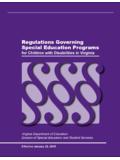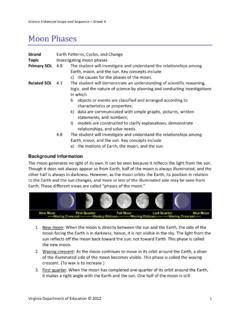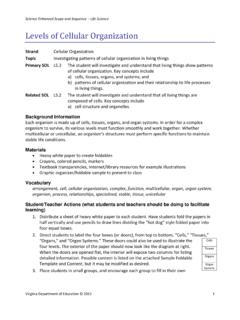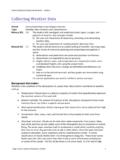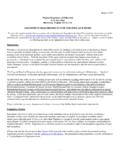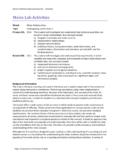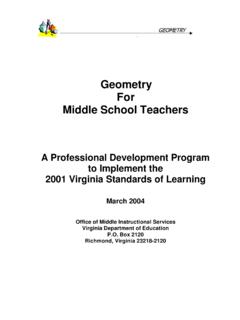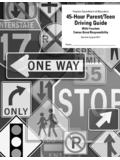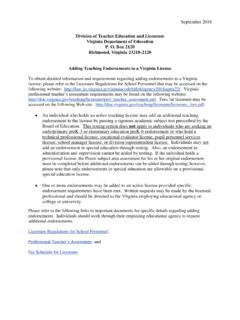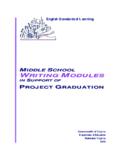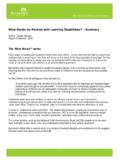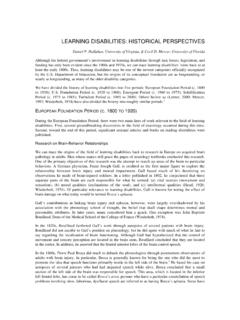Transcription of Guidelines for Educating Students with Specific Learning ...
1 Guidelines for Educating Students with Specific Learning disabilities (SLD). Virginia's Guidelines for Educating Students with Specific Learning disabilities Virginia Department of Education Revised February 2017. 1. Guidelines for Educating Students with Specific Learning disabilities (SLD). Acknowledgements The Virginia Department of Education (VDOE) wishes to acknowledge all those who provided assistance in the development and review of this guidance document. Silvana Watson, Virginia Department of Education Associate Professor in Special Education Old Dominion University John Eisenberg, (primary author) Assistant Superintendent for Special Education and Student Services Virginia Council of Administrators for Special Education (VCASE) Patricia Haymes, Board Members and Teachers Director, Office of Dispute Resolution and Administrative Services Jim Gallagher Amherst County Public Schools Patricia Abrams, President, VCASE Director, Special Education Instructional Services Wyllys VanDerwerker Deborah Johnson, Lynchburg City Schools Specialist, Special Education Instructional Services Shelia Bailey, Marie Ireland, Hopewell City Schools Specialist, Special education Instructional Services Rachel Jenner Teresa Lee, Rockingham County Schools Specialist, Special Education Instructional Services Wayne Barry, Specialist, Student Services Mary Stowe, The College of William and Mary Training and Technical Center 2.
2 Guidelines for Educating Students with Specific Learning disabilities (SLD). Guidelines for Educating Students with Specific Learning disabilities (SLD). Table of Contents Introduction .. 5. Foundational Competencies .. 6. Introduction to Specific Learning disabilities .. 6. IDEA Definition ..6. Explanation of definition ..6. Types of SLD ( , dyslexia) .. 6. Characteristics of Students with Specific Learning disabilities .. 8. Comorbid Disorders .. 9. The Special Education Process .. 11. Referral .. 11. Evaluation and Eligibility Process .. 11. SLD Identification Methods .. 11. Discrepancy .. 12. RTI .. 12. Alternative Research-Based Approach .. 12. Determination of Eligibility .. 12. Instructional Planning: Individualized Education Program (IEP) Development .. 13. Present Level of Academic Performance .. 13. Goals .. 13. Progress reports .. 13. Monitor.
3 13. Reporting .. 13. Special Education, Related Services, Supplementary Aids and Services .. 14. Accommodations .. 14. Modifications .. 14. Participation in State and District Accountability System .. 15. Placement and Least Restrictive Environment .. 15. Providing an Effective Education .. 17. Goals of Education and Intervention .. 17. Assessment .. 17. 3. Guidelines for Educating Students with Specific Learning disabilities (SLD). Types of Assessment Instruments .. 17. Standardized Tests .. 17. Non-standardized Assessments .. 18. Research-Based Instruction (Evidence-Based Practices) .. 18. Research-Based Instructional Strategies .. 19. Reading Strategies for Students with SLD .. 19. Mathematics Strategies .. 23. Written Language Strategies .. 25. Social Studies and Science Strategies .. 28. Social Skills Strategies .. 29. Important Considerations in Educational Programming.
4 30. Early Intervention .. 30. Assistive Technology .. 30. Classroom Management .. 30. Reasearch-Based Behavior Interventions .. 31. Adolescents with SLD and Transition .. 31. Racial/Ethnic/Cultural/Linguistic/Socioe conomic Diverse Students with SLD .. 32. The Twice Exceptional Student .. 33. Web sites of SLD Organizations and Related SLD Areas .. 35. References .. 36. 4. Guidelines for Educating Students with Specific Learning disabilities (SLD). Introduction T his Guidelines document is designed to be a resource for teachers and administrators as they address the educational needs of Students with a Specific Learning Disability (SLD) in Virginia. Parents of children with SLD may find this document useful as well. These Guidelines offer an overview of best practices for Educating individuals with SLD and should be used in conjunction with the Virginia Department of Education (VDOE) Regulations Governing Special Education Program for Children with disabilities in Virginia as well as other VDOE guidance documents.
5 The Guidelines are informational and are not mandated. Also, the location and/. or content of the Web site links may have changed since the publication of this document. Additional information and resources may be found on the VDOE Web site at: gov or by contacting the VDOE at: Virginia Department of Education Division of Special Education and Student Services Box 2120. Richmond, VA 23218-2120. 1-800-422-2083. Text Users Dial: 711(Relay). Copyright 2014. Commonwealth of Virginia Department of Education This document can be reproduced and distributed for educational purposes. No commercial use of this document is permitted. Contact the Division of Special Education and Student Services prior to adapting or modifying this document for noncommercial purposes. The Virginia Department of Education does not discriminate on the basis of race, sex, color, national origin, religion, age, political affiliation, veteran status, or against otherwise qualified persons with disabilities in its programs and activities and provides equal access to the Boy Scouts and other designated youth groups.
6 5. Guidelines for for Guidelines Educating Students Educating Students withwith Specific Specific LearningLearning disabilities disabilities (SLD). Foundational Competencies Introduction to a Specific Learning .. that may manifest itself in an imperfect Disability (SLD) ability to .. read .. or do mathematical calculations .. : Specific Learning disabilities Specific Learning disabilities Defined affect the academic performance of the student. Specific Learning disabilities represent a heterogeneous .. does not include Learning problems that set of neurobiological disorders that include are primarily the result of visual, hearing.. : difficulties in several academic and social domains. The exclusion component asserts that the Specific Learning disability is not caused by these factors. IDEA Definition However, the word primarily' suggests that Learning disabilities can coexist with those conditions.
7 According to the Individuals with disabilities Educational Improvement Act (IDEA) and Virginia Types of Specific Learning disabilities Regulations at 8 VAC-20-81-10, a Specific Learning Disability means a disorder in one or more basic SLD occurs regardless of such factors as an psychological processes involved in understanding individual's culture, race, language, gender, or or in using language, spoken or written, that may socioeconomic status. In March 2011, the National manifest itself in an imperfect ability to listen, Joint Committee on Learning disabilities pointed think, speak, read, write, spell, or do mathematical out that SLD persist in various forms across the life calculations, including conditions such as perceptual span, with precursor most often language delays disabilities , brain injury, dyslexia, or developmental or language deficits in early childhood appearing aphasia.
8 Before schooling begins into adulthood (NJCLD, 2008). Furthermore, various types of SLD have been Specific Learning disability does not include recognized in the research. The most common types Learning problems that are primarily the result are addressed below. of visual, hearing, or motor disabilities ; of intellectual disabilities ; of emotional disabilities ; of Dyslexia: Virginia's regulations define dyslexia environmental, cultural, or economic disadvantage. as distinguished from other Learning disabilities ( of the Code of Virginia; 34 CFR (c) due to its weakness occurring at the phonological (10)). level. Dyslexia is a Specific Learning disability that is neurobiological in origin. It is characterized Explanation of Definition by difficulties with accurate and/or fluent word recognition and by poor spelling and decoding .. a disorder .. basic psychological processes : abilities.
9 These difficulties typically result from a There is an assumption that some type of disorder deficit in the phonological component of language of perception, language, or cognition ( , memory) that is often unexpected in relation to other cognitive prevents the student from Learning . abilities and the provision of effective classroom instruction. Secondary consequences may include .. involved in understanding or in using problems in reading comprehension and reduced language, spoken or written : A Specific Learning reading experience that can impede growth of Disability is a language-based disability, meaning that vocabulary and background knowledge. 8 VAC 20- the disability has to do with difficulty with words and 81-10. rules of sounds that make up words and words to make up sentences. It includes deficient skills in oral expression and listening comprehension.
10 6. Guidelines for Educating Students with Specific Learning disabilities (SLD). In other words, dyslexia is a reading, decoding Research suggests that teaching reading should and spelling problem. Assessment of decoding include explicit and systematic instruction of problems includes reading lists of real words (1) phonological awareness, (2) applying phonics with or without context clues and pseudowords (alphabetic principle) and morphology to decoding, (pronounceable words that do not have meaning (3) applying background knowledge already but sound like English words, such as tat). Students learned to unfamiliar words or concepts in material with dyslexia do not usually have problems with to be read (activating prior knowledge), (4) both listening comprehension or verbal reasoning. oral reading and silent reading with appropriate Some Students , however, may have significant oral instructional materials, (5) activities to develop language problems, including listening and reading reading fluency, and (6) reading comprehension.
